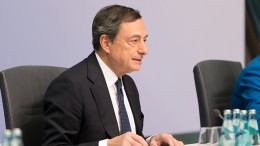No Changes in ECB
The European Central Bank kept monetary policy unchanged: interest rates on hold and made only its previous broad commitment to run bond-buying for as long as needed, stopping short of a formal extension of quantitative easing, as expected on Thursday. Indeed, the institution didn’t make any adjustments to its quantitative easing program of asset purchases. That program includes monthly purchases of 80 billion euros and is set to run at least…










